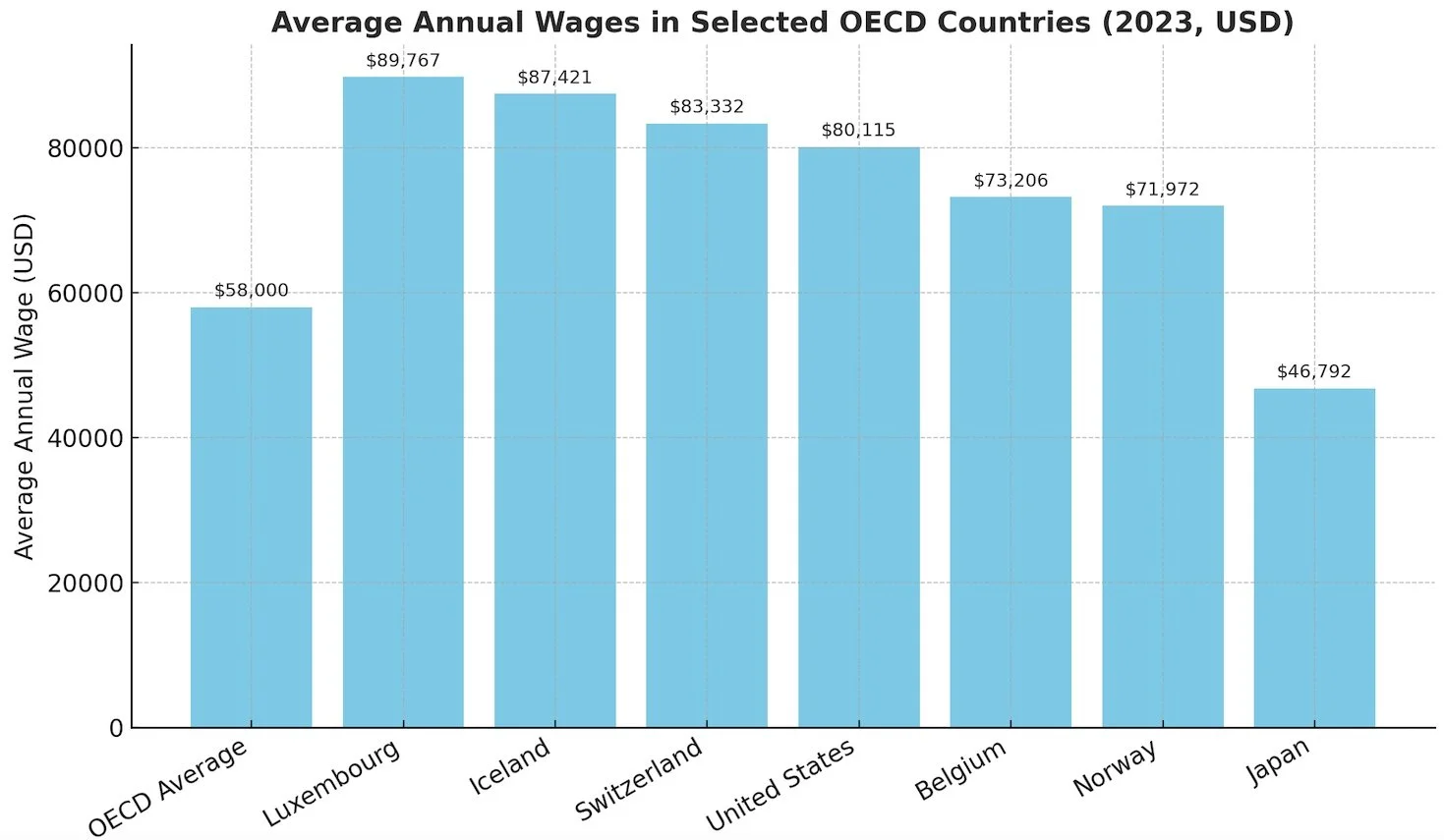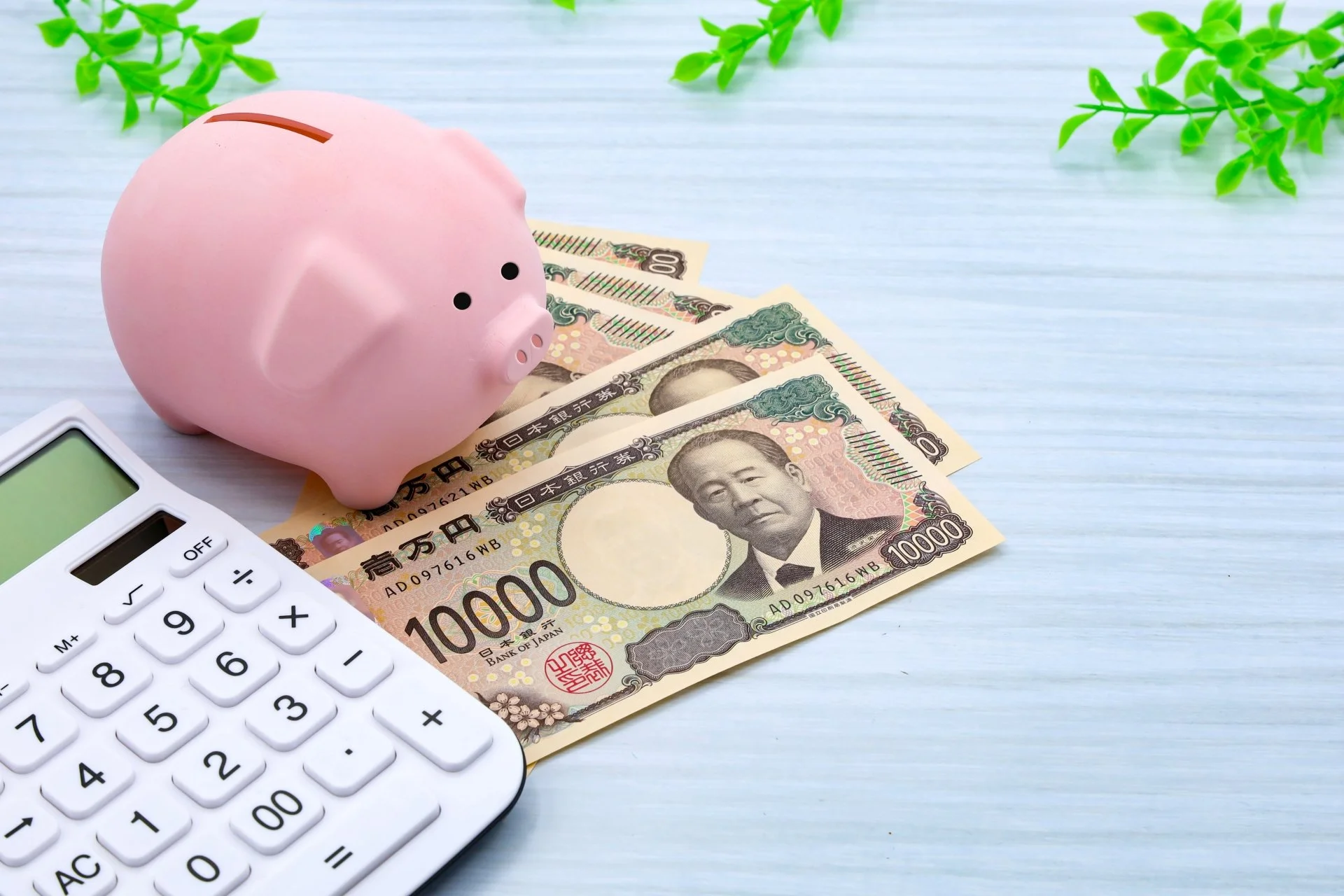Behind Japan’s Salary System: Why Pay Works Differently
Moving to Japan often comes with salary shock. OECD data shows Japan’s average annual salary at around USD 46,792 (26th place), well below the OECD average (USD 58,000) and far behind countries like Luxembourg (USD 89,767) or the U.S. (USD 80,115). See the top 6 rankings + Japan below.
Data source: Average Annual Wages in OECD Countries (2023, USD)
OECD data (Full Time Employee basis). *Japan’s National Tax Agency figure is lower (JPY4.6M / about USD 32K) because it includes part-time and temp workers. *See Section 1/Benchmarking. OECD uses the term ‘wages’ for statistical purposes, but this roughly corresponds to what professionals would think of as ‘salary.’
The reality is that compensation in Japan reflects different systems, benchmarks, and philosophies.
When you look at how Japanese companies set pay compared to foreign firms, the contrast becomes clear—and so does the reason many expats feel underwhelmed. Understanding these differences also reveals where the real opportunities are, if you know where to look.
The blog covers:
* This blog focuses only on base salary, not on bonuses, incentives, or allowances.
1. How Japanese Companies Set Pay
2. How Foreign Firms in Japan Set Pay
3. Why Hiring Track Makes the Difference
4. Where the Real Opportunities (and Pay) Are
5. FAQs: Salary & Pay in Japan
6. Wrap Up
1. How Japanese Companies Set Pay
✅ Pay Philosophy: Long-Term Stability and Development
Japanese companies have long tied pay to age, years of service, and general ability. This so-called “person-based pay”system provides stability through two mechanisms: regular annual raises (定期昇給) and base-salary increases (ベースアップ).
✅ Base Salary Increases
In Japan, the mainstream salary increase system typically combines the following:
Regular annual raises: A typical practice might be expressed as: “For each additional year of service, the base salary increases by JPY2,000 (about USD14).
Base-salary increase: A uniform raise applied across all employees, regardless of years of service or individual performance. For example, if a company implements a 2% base-up, an employee earning JPY200,000 per month would move to JPY204,000
In 2024, over 80% of companies raised salaries under inflation and government pressure, but most were defensive—broad adjustments for fairness—rather than offensive hikes rewarding top performers or scarce digital talent.
This preserves stability but does not fully close pay gaps, especially in globally competitive fields.
🌍 Cultural Note: Rotation and Lifetime Employment
Most new graduates join companies without a set role. They’re rotated across departments until management finds the right fit. This reinforces loyalty and broad skills but slows career acceleration compared with “job-based pay “systems abroad.
✅ The System Is Changing
Surveys show that while many firms still rely on person-based or hybrid models, more companies are shifting toward job-based pay.
Deloitte’s Employee Rewards Survey 2024 found that over 80% of firms have revised or plan to revise their HR systems across all job levels.
For specialists in particular, the share of companies adopting job-based frameworks has increased significantly, reflecting intensifying competition for scarce digital and other highly skilled talent.
✅ Benchmarking
Traditionally, many Japanese companies benchmark salaries against public government data (e.g., National Tax Agency averages). This keeps pay conservative: the National Tax Agency’s 2023 survey reported an average of about JPY4.6 million (about USD 32,000) across all industries and job types, including part-time roles.
Larger corporations—especially global firms—often use compensation surveys from providers such as Mercer or Aon Hewitt. These are reliable but costly, and participation to the survey requires significant time and effort.
👉 The key difference lies in scope:
Many Japanese firms benchmark only against domestic data such as the National Tax Agency averages.
Larger corporations often benchmark against domestic data and surveys of Japanese competitors.
Foreign-owned firms in Japan benchmark against market surveys of other foreign firms operating in Japan/competitors, where salary levels are typically much higher.
This difference in benchmarking explains much of the salary gap between traditional Japanese companies and foreign-owned companies in Japan.
In addition to benchmarking data, many Japanese firms also validate salary budgets using metrics like value-added per employee, profit per employee, labor distribution ratios and so forth. These ensure pay levels stay aligned with overall company performance, but they also reinforce a conservative approach to compensation.
✅ Rise of Incentive Plans
Many Japanese companies struggle with a mismatch in pay levels for digital and other highly skilled talent. To compete for and retain these employees, firms are introducing new incentive structures.
This trend brings Japan closer to global standards, although the scale of incentives remains smaller compared with U.S. and European firms, where equity-based rewards are a core part of total compensation.
✅Example: Two Engineers
Engineer A: 10 years’ experience, steady performer.
Engineer B: 5 years’ experience, innovative with global skills.
In the U.S., Engineer B might out-earn Engineer A. In Japan, both would fall into similar bands—because tenure and equity weigh more than performance.
2. How Foreign Firms in Japan Set Pay
✅ Pay Philosophy: Pay for Performance and Differentiation
Foreign-owned companies in Japan operate with a very different HR strategy from traditional Japanese firms.
Performance-driven: High performers receive higher pay and faster promotions.
Market-aligned: Salaries are calibrated to compete for scarce or specialized talent.
Less seniority bias: Young but skilled employees can leapfrog in pay. Age and years of service don’t matter.
🌍 Cultural Note
For foreign firms, the focus is simple: hire and keep top talent.
Salaries must therefore be competitive. For example, compliance officers are in short supply in the financial industry, which pushes salaries upward. High performers may be promoted off-cycle or given salaries above the standard pay band to ensure they stay.
But the culture can also be more demanding—often described as “Up or Out.” Salary increases are never guaranteed, and merit raises are tightly tied to individual performance.
✅ Benchmarks: Compensation Surveys of Direct Competitors in Japan
Foreign-owned companies in Japan (外資系) rarely look at national averages or government data. Instead, they benchmark against:
Other foreign companies operating in Japan
Global industry compensation surveys, which headquarters also reference to be competitive
The guiding question is: “What do similar roles pay in our industry here and abroad?”—not “What’s the domestic average?”
✅ Example: Consulting Industry
At a foreign consulting firm in Japan (Top firm):
At a foreign consulting firm in Japan:
Analyst (2 years’ experience): ~¥8M+ (~USD $55–60K)
Senior Consultant (individual contributor): ¥11–13M (~USD $75–90K)
Senior Consultant (managing teams or high-value projects): ¥14–16M+ (~USD $95–110K)
By contrast, in a traditional Japanese firm, a mid-level employee might still be earning around ¥6M (~USD $40K) even after a decade.
This reflects the global job-based philosophy, which ignores age or seniority and instead asks: “For this role, what value and performance did you deliver?”
3. Why Hiring Track Makes the Difference
One of the biggest myths among expats is that foreigners automatically get higher pay. That’s simply not true.
Local Hire = Same as Japanese Colleagues
If you’re hired in Japan as a local employee, your nationality doesn’t matter—you’ll be placed in the same salary structure as your Japanese peers.
Expat Package = A Different Game
The exception is if you’re an expatriate sent from headquarters. In that case, you may receive:
These packages can be generous. But keep in mind:
They cost companies a lot.
With easier communication tools today, fewer staff are sent on full expat packages.
Benefits are often less generous than they used to be.
Company Policies Differ
Each employer has its own approach, but in general, the key distinction is your hiring track—not your nationality.
4. Where the Real Opportunities (and Pay) Are
Foreign-owned companies in Japan remain the most reliable option for competitive pay. They benchmark against other foreign firms in Japan, not just domestic averages, and are more open to rewarding performance. Many also provide visa sponsorship if you bring specific value.
The profiles that stand out include:
High-skill specialists – Top-level IT, digital, AI, engineering, and finance talent.
Global practice carriers – People who can import overseas know-how and practices
Bilinguals – Fluent in Japanese plus English (or another major language).
HQ strategy executors – Able to implement global HQ policies effectively in Japan.
Culture cross-pollinators – Professionals who can bridge Japanese and global corporate cultures.
Shortage industries – Construction, nursing care, and skilled trades, where even limited Japanese ability may be acceptable.
👉 Practical takeaway: If you’re an expat aiming for strong compensation, focus on foreign firms and on roles where your global expertise, technical specialization, or bilingual ability creates clear competitive advantage.
Real Story:
One of my relatives began her career as an engineer at a startup. What struck her most was how different the environment felt compared with the traditional Japanese firm where she had interned.
The younger founders acted as supportive leaders—focusing on enabling employees rather than ordering them around. They also emphasized productivity and efficiency, a habit of addressing real root causes directly, and a strong focus on workplace culture.
This experience reflects a broader trend: Japan’s startup ecosystem is still small, but a new generation of companies is rethinking how work gets done.
Startups may not always match foreign-firm salaries (though some do), but they can offer exciting opportunities and a more fulfilling, purpose-driven way of working in Japan.
5. FAQs: Salary & Pay in Japan
Q1: Do foreigners get paid less than Japanese colleagues?
A1: No. If you’re hired locally, your nationality does not matter—you’ll be on the same pay scale as Japanese employees.
Q2: What’s an “expat package”?
A2: A premium package offered to employees transferred from overseas headquarters. (See the chart above for benefits)
Q3: Can I negotiate salary in Japan?
A3: Yes, but negotiation tends to be modest compared with the U.S. or Europe. You may be able to adjust your starting salary or annual raise slightly, but large jumps are rare unless you change employers.
Foreign-owned companies are generally more open to discussion, especially for candidates with in-demand skills.
However, be mindful of approach: Leading with questions about salary or leave may not leave the best impression. Employers generally prefer to see value first, then discuss compensation.
Japanese employers value modesty, while foreign employers often expect you to prove your value—compensation follows performance.
Q4: Why do so many foreigners complain about low pay?
A4: Because they compare Japan’s domestic salary structures with global benchmarks. The gap is real—especially in traditional Japanese firms that benchmark against national averages.
Q5: What are the “five principles of wages” (賃金の5原則)?
A5: Set out in Article 24 of the Labor Standards Act, these five principles ensure workers are paid fairly and on time.
Payment in currency – Wages must be paid in money (not goods, vouchers, or products).
Direct payment – Wages must be paid directly to the employee. (e.g. not to your family member)
Full payment – Wages must be paid in full (deductions are only allowed when legally permitted, such as for tax or social insurance).
At least once a month – Wages must be paid at least once every month.
On a fixed date – Wages must be paid on a predetermined, regular payday.
Violating these principles can result in legal penalties. They are designed to protect workers’ rights and provide stability in daily life.
📌 Example: If an employer delays payment beyond the agreed payday without a legal reason, it may violate principle 5 (“on a fixed date”), and the employee has grounds to take the issue to the Labor Standards Inspection Office. However, escalate it to your HR first.
Q6: My salary hasn’t been paid. What should I do?
A6: Raise the issue immediately with your manager or HR. Collect and keep relevant documents to support your case, such as:
Your employment contract or offer letter
Rules of employment
Pay slips and bank statements
Timecards or personal records of working hours
Any correspondence about the issue
If the problem is not resolved, you can seek advice from the Labor Standards Inspection Office (労働基準監督署) in your area or a labor attorney.
Q7: My salary was reduced. What should I do?
A7: Salary cuts typically require employee consent under Japanese law.
Employers cannot reduce salary unilaterally without proper explanation and legal basis. Confirm the reason in writing and consult HR. If unresolved, contact the Labor Standards Inspection Office or a labor attorney.
Q8: What is the minimum wage in Japan?
A8: Minimum wage is set by each prefecture and reviewed annually. As of today, the minimum wage in Tokyo is ¥1,163 per hour.
8.Wrap Up
Compensation in Japan feels low not because companies are “unfair,” but because the systems themselves are designed differently.
Japanese firms value stability and equity, benchmarking against national averages.
Foreign firms value performance and competitiveness, benchmarking against other foreign-owned companies in Japan.
In the U.S., I have seen dynamic compensation practices where high performers are clearly identified and highly rewarded — and in many cases, that makes sense, because top performers can drive disproportionate results. But I have also seen my share of so-called “brilliant jerks,” and rewarding them too much can damage culture.
By contrast, Japanese companies invest heavily in development, giving employees the opportunity to grow over time. While I strongly agree that salary levels in Japan need to rise, I don’t believe Japanese practices are inherently bad. They reflect a different set of values.
For foreigners, the smartest move is to understand these systems — and target the environment where your skills and goals will be most valued.
📌 For related insights, see my blog post: Employment Contracts in Japan – What You Need to Know







